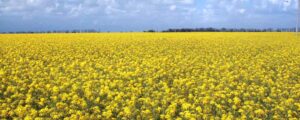
Agrofirm Dobrobut from the group of companies of Astarta agro-industrial holding Astarta, the largest sugar producer in the country, has started sowing winter rape for the season-2024.
According to information on the website of the Warsaw Stock Exchange (WSE), the agroholding will reduce the area under rape by 12% in the new season and will allocate 12,000 hectares to it.
“Compared to last year, we reduced the sown area under rapeseed by 12%, but only at the expense of crop rotation,” the press service quoted Astarta’s director of agricultural production Vadim Skrypnyk as saying.
He noted that for the Poltava region, which is always subject to unfavorable weather conditions in summer, sowing winter crops is the least risky and allows you to get good yields. “In addition, we have noticed that early sowing brings a positive effect. Therefore, this year we start sowing earlier where possible,” he added.
According to the agricultural holding, Astarta will start sowing somewhat later in the western regions of the country due to a delay in winter wheat harvest due to weather conditions.
“Astarta is a vertically integrated agro-industrial holding operating in eight regions of Ukraine. It includes six sugar mills, agricultural farms with a land bank of 220,000 hectares and dairy farms with 22,000 cattle, an oil extraction plant in Globino (Poltava region), seven elevators and a biogas complex.
In the first half of 2023, Astarta’s revenue from sales of key products increased by 64.8% year-on-year to UAH 10.72 bln. The main contribution was made by sales of sugar – UAH 3.27 bln, which increased by 75.5%, corn – UAH 2.66 bln (+53.2%) and soybean meal – UAH 1.96 bln (+84.5%).
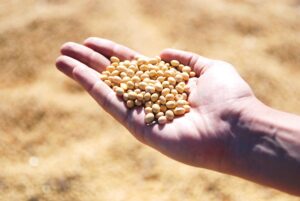
Agro-industrial holding Astarta, the largest sugar producer in the country, exported 833 thousand tons of products to 40 countries during the 2022-2023 marketing year (MY, September-August) under conditions of limited logistical opportunities.
“Despite the constant blocking of Russian maritime trade routes and other export restrictions, we managed to deliver to foreign markets and 563 thousand tons of grains and oilseeds, including 177 thousand tons of wheat and 386 thousand tons of corn. Italy, Spain, Indonesia and Kenya became the main importers of wheat, and China, Portugal and Spain – corn,” – reported the press service of the holding in Facebook.
According to the company’s data, the main consumers of soybean products during this period were EU countries, where Astarta supplied 48 thousand tons of soybean oil and 133 thousand tons of soybean meal, taking the second and first place among exporters of these products to the EU, respectively.
In addition, the holding also supplied 52 thousand tons of sugar to European markets, which also allowed Astarta to maintain its leading position among Ukrainian exporters.
“Due to our properly built reputation, transparency and consistency of business, we were ready for integration into European markets with both our main products and niche products. Incidentally, the niche ones, including organic flax and mustard, were one of the discoveries last season. It was their presence in our product portfolio that allowed us to work with both major and regional players in the European Union,” said Astarta’s commercial director Vyacheslav Chuk, whose words are quoted in the report.
He added that Astarta plans to deepen trade relations with key European partners and develop a product line under its own brand.
“Astarta” is a vertically integrated agro-industrial holding operating in eight regions of Ukraine. It includes six sugar factories, agricultural farms with a land bank of 220 thousand hectares and dairy farms with 22 thousand cattle, an oil extraction plant in Globino (Poltava region), seven elevators and a biogas complex.
In the first half of 2023, Astarta’s revenue from sales of key products increased by 64.8% year-on-year to UAH 10.72 bln. The main contribution was made by sales of sugar – UAH 3.27 bln, which increased by 75.5%, corn – UAH 2.66 bln (+53.2%) and soybean meal – UAH 1.96 bln (+84.5%).
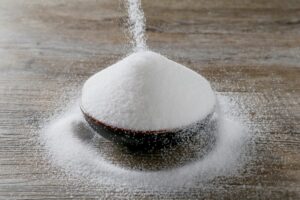
Agro-industrial holding Astarta, the largest sugar producer in Ukraine, in April-June 2023 increased revenue from sales of key products by 68.3% compared to the same period last year – up to UAH 4.7 billion, according to the data published by it on the Warsaw Stock Exchange.
According to them, sugar sales increased by 9.2% year-on-year in the second quarter of this year to 68.9 thousand tons, while its average selling price increased by 40.6% to UAH 28.16 thousand per ton.
Milk sales in the second quarter of 2023 increased by 20.9% to 28.4 thousand tons, soybean oil – by 50.7% to 12.3 thousand tons, soybean meal – by 92% to 58.9 thousand tons.
Corn sales jumped 80.5% to 58.8 thousand tons, wheat sales jumped 95.6% to 5.9 thousand tons, and sunflower seed sales jumped 2.9 times to 28.6 thousand tons.
Agroholding specified that such an increase in sales in physical terms allowed to compensate for lower prices for most types of products. In particular, soybean oil fell in price by 28.8% to UAH 33.06 thousand/ton, wheat – by 26.8% to UAH 4.20 thousand/ton, sunflower seeds – by 21.5% to UAH 13.26 thousand/ton, corn – by 4.6% to UAH 6.85 thousand/ton.
Only soybean meal – by 33.6%, up to UAH 19.98 thousand/ton and milk – by 6.0%, up to UAH 13.09 thousand/ton.
Thus, sales of sugar in the second quarter increased by 53.6% to UAH 1 billion 938.8 million, wheat – by 24.8% to UAH 43.1 million, corn – by 72.2% to UAH 402.8 million, and sunflower seeds – by 72.2% to UAH 1 billion 938.8 million, sunflower seeds – by almost 2.3 times, to UAH 379.4 mln, soybean oil – by 11.8%, to UAH 405.1 mln, soybean meal – by almost 2.6 times, to UAH 1 billion 176.8 mln and milk – by 28.1%, to UAH 371.6 mln.
Overall, in the first half of the year, Astarta’s revenue from the sale of key products increased by 64.8% to UAH 10.72 billion compared to the same period last year, according to data published by the Warsaw Stock Exchange.
The main contribution was made by sales of sugar – UAH 3.27 billion, up 75.5%, corn – UAH 2.66 billion (+53.2%) and soybean meal – UAH 1.96 billion (+84.5%).
“Astarta is a vertically integrated agro-industrial holding operating in eight regions of Ukraine. It includes six sugar factories, agro-farms with a land bank of 220 thousand hectares and dairy farms with 22 thousand cattle, an oil extraction plant in Globino (Poltava region), seven elevators and a biogas complex. In this marketing year, the company sowed 201 thousand hectares, which is 40% more than last year.
Agropromholding earned EUR16.13 mln of net profit in the first quarter of 2023, which is 6.2 times more than in the first quarter of 2022. Its revenue grew by 37.1% to EUR163.55m, while EBITDA increased by 63.5% to EUR37.91m.
In hryvnia terms, Astarta increased its net profit 7.5 times to UAH 632.59m in the first quarter of this year, while revenue grew 66.6% to UAH 6bn 415.09m.
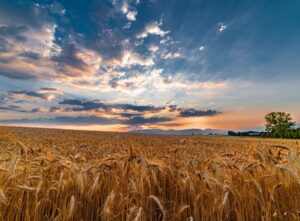
Astarta” agricultural holding, the largest sugar producer in the country, has started harvesting wheat and rapeseed in Poltava region. The harvesting process in the Western region will start in the middle of July, the press service of the holding announced on Facebook on Friday.
According to the message, Astarta plans to harvest early grains from an area of almost 57,000 hectares in 2023, including winter wheat from 43,000 hectares.
“Despite the existing challenges – more than 400 mobilized workers, a serious increase in the cost of production resources, the work in the mode of constant air rapture, the possibility of overlapping reaping of winter rape and wheat – we have qualitatively and timely prepared for harvesting. We carried out repairs, the necessary amount of agricultural equipment is ready, we have good condition of crops and good yield potential. And most importantly, the people – there are preserved and well prepared teams “- said the director of agricultural production Vadim Skrypnyk.
Astarta” said that they managed to sell almost the entire harvest last year, so grain elevators of the holding are ready to receive the new harvest. During the season of 2023, the harvesting will be accompanied by the implementation of digital products AgriChain, in particular the new module of AgriChain Logistics, aimed at the automation and efficient management of all processes.
“Together with agronomics, logistics, elevator and commercial services of “Astarta” we developed a mathematical model that comprehensively solves the transport task and allows making the most optimal plan of product placement on the company’s own and third-party elevators or, if necessary, involve reserve storage options,” – explained AgriChain Director Natalia Bogacheva, emphasizing the importance of this issue during the harvesting campaign.
According to her information, the IT-division reinforced the control system of collection, transportation and delivery to the place of harvest unloading, and it also brought the transportation routing to a new level, the system of access to loading trucks via NFC technology, the digital control system “friend-or-foe”, the notification system and rapid response to abnormal situations on the routes.
During the current harvesting campaign it is also planned to implement hourly dispatching of product delivery from the field to the storage locations through the work orders system, which will help to avoid queues, idle time, increase vehicle turnover and choose the best route.
“Astarta is a vertically integrated agro-industrial holding operating in eight regions of Ukraine. It consists of six sugar factories, farms with land bank of 220 thousand hectares, dairy farms with 22 thousand cattle, oil extraction plant in Globino (Poltava region), seven elevators and biogas complex.
Agroholding increased its net profit in 2021 14 times compared to 2020 – up to EUR 122.5 mln, EBITDA – 1.8 times, up to EUR 201.5 mln. Its revenue increased by 18.2% up to EUR 491.35 mln, one third of which (EUR 170 mln) was generated by sugar production and sales.
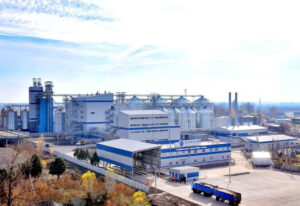
The European Bank for Reconstruction and Development (EBRD) is providing a $30 million financial package to Astarta, one of the country’s largest sugar producers, to cope with the adverse conditions caused by Russia’s war against Ukraine and ensure more sustainable operations.
According to the agroholding’s announcement on the Warsaw Stock Exchange website Friday, the package consists of a $21 million loan from the EBRD and $9 million from the Clean Technology Fund (CTF) aimed at sustainable development. Technical cooperation support for the legal review of the operation will be provided by the Technical Cooperation Fund of Japan and the EBRD.
“Funding for the holding company’s investment plan will help Astarte continue to develop agriculture, soybean processing and sugar production amid the instability associated with the war. The liquidity support provided through this loan will help support operations and maintain the production and export volumes needed for food security, while supporting Astarta’s nearly 7,000 employees along with employees of supply chain partners,” the statement noted.
According to the agri-holding, the financing will be used to modernize and improve the energy efficiency of existing production facilities, implement climate-smart agricultural practices to improve business sustainability, reduce production and energy costs while improving productivity and operational efficiency. The funds raised will also be used as working capital to support the agricultural holding’s operations at pre-war levels.
This is the first transaction in Ukraine supported by the EBRD’s High Impact Climate Program for the corporate sector financed by the Clean Technology Fund. The loan is characterized by an innovative blended finance structure where the price is linked to achieving climate change goals, Astarta noted.
As reported, the EBRD, which accelerated lending to Ukraine after the Russian invasion in February 2022, pledged to invest €3 billion in the country between 2022 and 2023. Food security is one of the five priority investment areas, along with energy security, vital infrastructure, trade finance and private sector support.
“Astarta is a vertically integrated agro-industrial holding operating in eight regions of Ukraine. It consists of six sugar factories, farms with land bank of 220 thousand hectares and dairy farms with 22 thousand cattle, oil extraction plant in Globino (Poltava region), seven elevators and biogas complex.
Agroindustrial holding Astarta, the largest sugar producer in Ukraine, received EUR65.16 mln of net profit in 2022, which is 46.8% less compared with 2021. The company’s EBITDA decreased by 23.2% to EUR154.77 mln last year, while revenues increased by 3.8% to EUR510.07 mln.
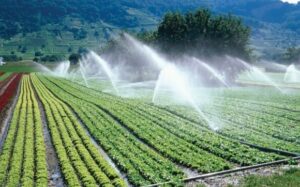
Agro-industrial holding Astarta, the largest sugar producer in the country, has expanded its irrigated area up to 1 thousand hectares and purchased five sprinklers, the company said on Facebook.
“The project is implemented in the IPK “Poltavazernoprodukt” Astarta-Kyiv Ltd. To the three sprinkler machines were added five more. For this purpose, we purchased four more frontal machines and one circular machine, in order to maximally cover the planned area with irrigation”, – said the agricultural holding.
The new sprinklers have already been put to work on the fields with sugar beets and hybrid corn. There are 14 hydro technicians working in shifts to maintain the machines. Water for irrigation is supplied by Poltava Regional Water Resources Office. To supply it to the fields, the agricultural holding restored and additionally laid about 10 km of communications, explained in “Astarta”.
Restoration of the irrigation system in the agrofirm began back in 2015 on an area of 300 hectares with drip irrigation.
“Currently, the project has been successfully implemented, despite all the economic difficulties and the war,” summarized in the agricultural holding.
“Astarta” is a vertically integrated agro-industrial holding operating in eight regions of Ukraine. It consists of six sugar factories, farms with land bank of 220 thousand hectares, dairy farms with 22 thousand cattle, oil extraction plant in Globino (Poltava region), seven elevators and biogas complex.
Agricultural holding in 2021 increased net profit 14 times compared with 2020 – up to EUR 122.5 mln, EBITDA – 1.8 times, up to EUR 201.5 mln. Its revenue increased by 18.2% – to EUR 491.35 mln, one third of which (EUR 170 mln) was generated by sugar production and sales.